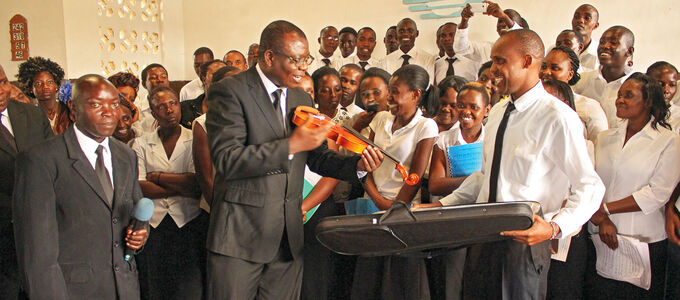Spotlight 9/2024: What role models teach us with their prayers

Moses, Hezekiah, or Paul—the Bible gives us great role models for prayer. District Apostle Opemba Ekhuya from Kenya in East Africa explains what we can learn from them as he reflects on our 2024 motto “Prayer works!”
Exodus 33: 11–14 should strengthen our confidence in prayer. The Bible says that the Lord spoke to Moses face to face, as a man speaks to his friend. Moses said to the Lord, “See, You say to me, ‘Bring up this people.’ But You have not let me know whom You will send with me. Yet You have said, ‘I know you by name, and you have also found grace in My sight.’ Now therefore, I pray, if I have found grace in Your sight, show me now Your way, that I may know You and that I may find grace in Your sight.” And God said, “My Presence will go with you, and I will give you rest.” That was the conversation between Moses and God. When we read further in the Old Testament, we notice that the presence of God really did go with them, and God brought them to Canaan as He had promised Moses.
Prayer is having a conversation with God. It consists of praising God, confessing our sins, thanking God, and asking Him for the things we need. When we pray we should be conscious in our mind that God is near us, is listening, and will answer. God is available and can be reached. The Bible says in James 1: 6–8 that when we ask for something from God, we should ask in faith and not doubt. Engaging our faith in prayer is a higher level of conversation because we are able to visualise the invisible God and ask Him to intervene in the visible world. In Hebrews 11: 1–3 it says that “faith is the substance of things hoped for, the evidence of things not seen. … By faith we understand that the worlds were framed by the word of God, so that the things which are seen were not made of things which are visible.”
On Paul’s second missionary trip, the Bible says that the believers commended Paul and Silas to the grace of God, that is, they prayed for them (Acts 15: 40). But when the two missionaries started off, they were forbidden by the Holy Spirit to preach the word in Asia. We can read this. They tried to go into Bithynia, but again the Spirit would not allow them to. Then they went to Troas. And it was in Troas that Paul had a vision in the night in which he was directed to go to Macedonia. From Macedonia, he was able to launch the gospel into Europe.
Here again we see that prayer works, but we cannot use prayer to force an outcome that is not according to God’s will. If God grants us persistence in such matters, it will be to teach us that His will is best for us. We can learn this from Hezekiah’s prayer and how things developed in 2 Kings 20: 1–3.
Prayer removes stress, prayer teaches us gratefulness, prayer brings balance in our life, and prayer strengthens our hope and trust in God. Prayer is the breathing of the soul. We should pray as many times as possible in a day.




